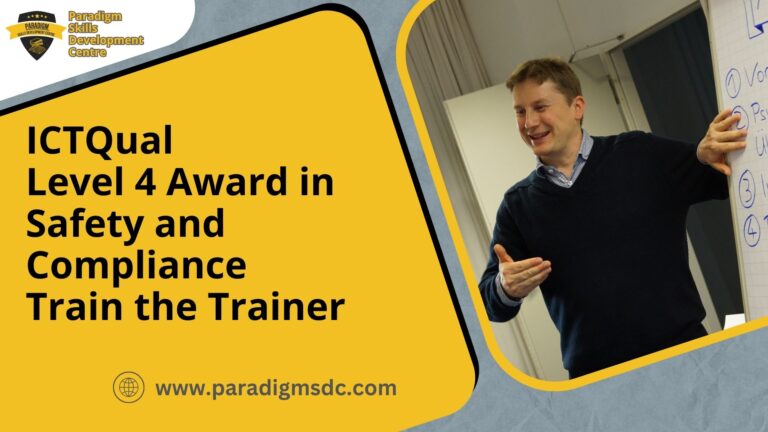Course Introduction
The ICTQual Level 3 Award in Elderly Care and Caring for the Disabled aims to provide learners with a thorough understanding of best practices in caring for the elderly and disabled. This course covers essential aspects of caregiving, from basic health and safety protocols to advanced communication techniques and personalized care plans. By completing this course, participants will be well-prepared to deliver high-quality, compassionate care in a variety of settings.
Course Overview
This comprehensive course delves into the multifaceted nature of elderly and disability care. It combines theoretical knowledge with practical skills, ensuring that participants are well-equipped to meet the challenges and responsibilities of caregiving. The course is delivered through a combination of online learning, interactive workshops, and practical assessments, providing a well-rounded educational experience.
Course Study Units
- Understanding the Aging Process
- Principles of Disability Care
- Effective Communication in Caregiving
- Health and Safety in Care Settings
- Personal Care and Hygiene
- Managing Chronic Conditions
- Palliative and End-of-Life Care
- Ethical and Legal Considerations
- Promoting Independence and Well-being
Learning Outcomes
Upon completing the ICTQual Level 3 Award in Elderly Care and Caring for the Disabled, participants will be able to:
Understanding the Aging Process
- Identify Biological Changes: Understand the physiological changes associated with aging and their implications for health and daily living.
- Assess Psychological Impact: Recognize the psychological effects of aging, including mental health challenges and cognitive decline.
- Analyze Social Dynamics: Evaluate the social changes that occur with aging and how they affect relationships and community involvement.
2. Principles of Disability Care
- Categorize Disabilities: Identify and categorize different types of disabilities (physical, sensory, intellectual, and mental health).
- Promote Inclusion: Implement strategies to create inclusive environments and reduce stigma against individuals with disabilities.
- Understand Legal Frameworks: Apply knowledge of relevant legislation and the rights of individuals with disabilities in caregiving practices.
3. Effective Communication in Caregiving
- Utilize Communication Techniques: Employ effective verbal and non-verbal communication techniques tailored to the needs of elderly and disabled individuals.
- Enhance Listening Skills: Demonstrate active listening skills to better understand and respond to care recipients’ needs.
- Develop Interpersonal Skills: Build and maintain positive relationships with care recipients, their families, and other healthcare professionals.
4. Health and Safety in Care Settings
- Conduct Risk Assessments: Identify potential risks in caregiving environments and implement strategies to mitigate them.
- Apply Infection Control Measures: Understand and apply protocols for preventing and controlling infections in care settings.
- Respond to Emergencies: Prepare for and effectively respond to emergencies, ensuring the safety and well-being of care recipients.
5. Personal Care and Hygiene
- Assist with Daily Activities: Competently assist individuals with activities of daily living, including bathing, dressing, grooming, and toileting.
- Ensure Nutrition and Hydration: Understand and address the nutritional and hydration needs of elderly and disabled individuals.
- Support Mobility: Safely assist individuals with mobility issues, including the use of assistive devices and techniques.
6. Managing Chronic Conditions
- Identify Chronic Conditions: Recognize common chronic conditions affecting elderly and disabled individuals and understand their management.
- Manage Medications: Safely administer and manage medications, understanding their effects and potential side effects.
- Implement Pain Management Strategies: Assess and manage pain effectively, enhancing the comfort and quality of life for care recipients.
7. Palliative and End-of-Life Care
- Understand Palliative Care Principles: Apply the principles of palliative care to provide comfort and support to those with life-limiting illnesses.
- Plan End-of-Life Care: Assist in end-of-life planning, respecting the wishes and needs of individuals and their families.
- Provide Emotional Support: Offer emotional and spiritual support to individuals and their families during end-of-life care.
8. Ethical and Legal Considerations
- Apply Ethical Principles: Understand and apply ethical principles in caregiving, including autonomy, beneficence
, and confidentiality.
- Navigate Legal Responsibilities: Comprehend and adhere to the legal responsibilities and obligations of caregivers, including safeguarding and obtaining consent.
- Resolve Ethical Dilemmas: Identify and address ethical dilemmas in caregiving practices, ensuring decisions are made in the best interest of the care recipient.
9. Promoting Independence and Well-being
- Encourage Independence: Develop and implement strategies to promote independence and self-care among elderly and disabled individuals.
- Support Mental and Emotional Health: Recognize the importance of mental and emotional well-being and apply methods to support it through activities and therapies.
- Foster Social Engagement: Create opportunities for social interaction and community involvement, enhancing the overall well-being of care recipients.
Course Benefits
- Enhanced Knowledge: Gain a comprehensive understanding of elderly and disability care.
- Practical Skills: Develop essential caregiving skills through hands-on training.
- Career Advancement: Improve career prospects in the healthcare and caregiving sectors.
- Quality of Care: Enhance the quality of life for elderly and disabled individuals.
- Professional Confidence: Build confidence in delivering compassionate and competent care.
Who Is This Course For?
The ICTQual Level 3 Award in Elderly Care and Caring for the Disabled is ideal for:
- Caregivers seeking to improve their skills and knowledge in elderly and disability care.
- Healthcare professionals working in nursing homes, assisted living facilities, or home care settings.
- Family members providing care to elderly or disabled loved ones.
- Individuals aspiring to enter the caregiving profession.
- Social workers and community support workers focusing on elderly and disabled populations.
Future Progression
Upon completing the ICTQual Level 3 Award in Elderly Care and Caring for the Disabled, participants can further their education and career development through:
- Advanced Caregiving Courses: Pursue higher-level qualifications in specialized areas of caregiving.
- Professional Certifications: Obtain certifications in geriatric care, disability care, or related fields.
- Higher Education: Enroll in undergraduate or postgraduate programs in nursing, social work, or healthcare management.
- Specialized Training: Participate in specialized training programs focusing on dementia care, palliative care, or rehabilitation.
- Leadership Roles: Progress to supervisory or managerial positions in care settings.
The ICTQual Level 3 Award in Elderly Care and Caring for the Disabled is an invaluable step towards a rewarding and impactful career in caregiving. Equip yourself with the skills and knowledge to make a meaningful difference in the lives of elderly and disabled individuals. Embrace the opportunity to provide compassionate, high-quality care and elevate the standards of caregiving in your community.







